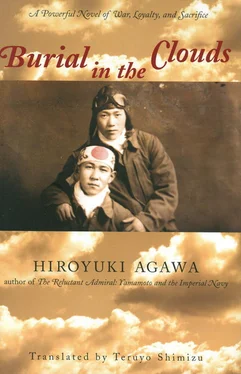It was clear and sunny all day today. I felt not the slightest anxiety from takeoff to landing. It was exhilarating. We cut into the wind as we descended, and all of a sudden, each solitary blade of grass came into clear view, as when a camera snaps into focus. Next I saw the grass pressed down by the wind, and in a split second my feet were on the ground. Who would believe that just five or ten meters of lovely green grass during a landing, or a variation of just three to five degrees in inclination, can mark the difference between life and death?
I felt fairly well accustomed to flying my second and third times up, but during the third flight the wind shifted abruptly from east to west, somewhere around the fourth turning point, just before we started our descent. Without warning I lurched 180 degrees into a vertical turn. Before I knew it, the sky and the earth were at my sides and the horizon slipped at a right angle before my eyes. I didn’t know up from down or right from left. A thrill of horror shot through me, but of course we landed safely all the same. I flew three times, for a total of twenty-two minutes in the air. This duration is recorded in a log, and once our accumulated flight time reaches three or four hundred hours, we should be full-fledged pilots, capable of manipulating the plane as if it were an extension of the body.
Attaining for the first time a bird’s-eye view of the sea, and of the mountains of southern Kyushu, I know what Nagata-no-Okimi felt when he sang (in volume three of the Manyoshu ),
The narrows of Satsuma,
The home of the Hayahito folk
Far beyond the clouds:
All of this I saw today.
Izumi is some two and a half hours by express train from Kagoshima, via Ijuin, Sendai, and Akune, and it is a place of utter scenic beauty. Izumi looks across the Shiranui Sea to Amakusa, and the Koshiki-jima Islands lie off to the southwest. Beyond the sprawling airstrip of green grass you can see the silvery waves, even when you are standing on the ground. A lark has built a nest in the grass, and it sings as it flies, soaring as high as the planes.
Discipline is severe, the flying suits are stifling, and it’s no easy trick to sprint with the contents of your leg pockets kicking around. But we are all in high spirits. I clean forgot my birthday on May 30. I didn’t notice the day had passed until I was ordered to fill out a statement giving my personal history and background last night, and I’m actually pleased about this. I am twenty-four years old now.
The Hagakure, a book on bushido, says, “To conquer your enemy, first conquer your friends. To conquer your friends, first conquer yourself To conquer yourself, first conquer your body with your mind.” Whenever I caught even the slightest cold, I used to burrow under the covers, giving myself up to sloth, and I haven’t entirely vanquished the more indolent aspects of my character. But I really must rid myself of them soon, if I am ever to die a worthwhile death for my country, or if I am to discipline myself into maturity as a pilot in time.
Excursion from 0800. Generally, Kyushu is very well supplied, and our outings will be far more enjoyable than those we made in Tsuchiura. I wish mother could try one of the steamed yam-paste buns they make at the Brotherhood of Enlisted Men.
I had five bowls of sweet shiruko, drank four glasses of Calpis, and ate a parcel of snacks, a bowl of udon, and ten manju with yam-paste. Then I met Fujikura and Sakai, as we had earlier arranged, and walked with them from the Brotherhood out to Komenotsu, breaking a sweat under the early summer sun. Along the way we saw fields of ripe barley, the sprightly children of Kyushu, all tanned and barefoot, and then the bright sea beyond.
They say Komenotsu used to prosper as the point of export for rice produced all over these plains, but now it is a little fishing port renowned for its fine tiger prawns. We decided to leave the prawns for a later date and catch a train to Minamata. I heard that to the east of Komenotsu lies the site of the barrier of Noma, which runs along the northern border of the old Satsuma Clan, but we decided to save that for another day, too. Incidentally, as we walked from Izumi to Komenotsu, Fujikura started in with his constant complaint, claiming that Sakai and I had changed, and disagreeably, too.
“You say Japan will rally once we toe the line,” Fujikura said. “You say you will die honorably. Is this really, honestly, what you both think?” Who wouldn’t feel antagonized when challenged like this? So we fell to arguing. Essentially, all Fujikura wants to convey is his general opposition to the war, or at any rate his extremely pessimistic outlook as to its progress. He maintains that there is no good reason why we, having been drawn into this conflict through no choice of our own, should believe we must die for our country. His attitude also seems rather irresponsible and apathetic, and he basically says that nothing good will happen to Japan anyway, whether we die honorably or not.
“You despise fanaticism. You hate the foolish opportunism of all the scholars,” Fujikura continued. “But you fail to recognize that you are losing your own minds.” He does go on and is devious in the way he expresses his estimable opinions, though, and he didn’t used to be like this. Fujikura, too, may be losing his mind.
“But we can carry the war through,” I argued, “precisely because we are all just a little bit mad. That’s what the circumstances require.” Fujikura shot me a contemptuous look, but what does he believe we ought to do? This conversation makes me want to know, for once and for all, just how he thinks we should live—just how he thinks we should conduct ourselves, given our present situation.
“If you can figure out a way to save your own life,” he says, “then you can make it through. Don’t lose your head. Hold to your beliefs, and if there really is no way out of this mess, at least never give up your consciousness and your pride. When I say ‘consciousness,’ I have something rather different in mind from what you mean by the word.” I understand that Fujikura can really let loose only when he is alone with the three of us. We mustn’t cut him off, only to end up completely at odds with one another. But still, I feel a little angry.
We arrived in Minamata at around eleven o’clock, having managed to make our peace again on the train. A little up the slope near the station, along the Kagoshima Main Line, we spotted what appeared to be the old house of an illustrious family. Attached to it was a tranquil, luxuriant garden, with a mountain standing off to the back. We were intrigued, and after talking it over a bit, we decided to ask the family to let us see the house, knowing well how rude we were being.
“We are from the naval air station in Izumi,” we said, introducing ourselves. “And we were wondering—that is, if it’s no inconvenience to you—if we might enjoy your garden while we take a rest.” And they graciously ushered us in.
We found ourselves treated to a subtle infusion of powdered tea, which we rarely have a chance to drink, along with some cakes from Kagoshima called harukoma. The head of this household is a Mr. Nobunori Fukai. The family served the lords of Minamata Castle for generations. Mr. and Mrs. Fukai appear to be in their fifties, and they have a gentle, pleasant daughter, probably a few years younger than we are. She made the tea for us. There was a discreet garden pond among the bushes, and I could hear water dripping off the rocks. Deutzias were flowering. We grew silent for some reason, but we were fully gratified at heart. Personally, I have never been much interested in the gardens at Dai-sen-in or at Ryoan-ji Temple, and I certainly don’t mean to compare the Fukais’ garden with those. But it has been a very long time since I knew such serenity, and in such a peaceful setting.
Читать дальше












